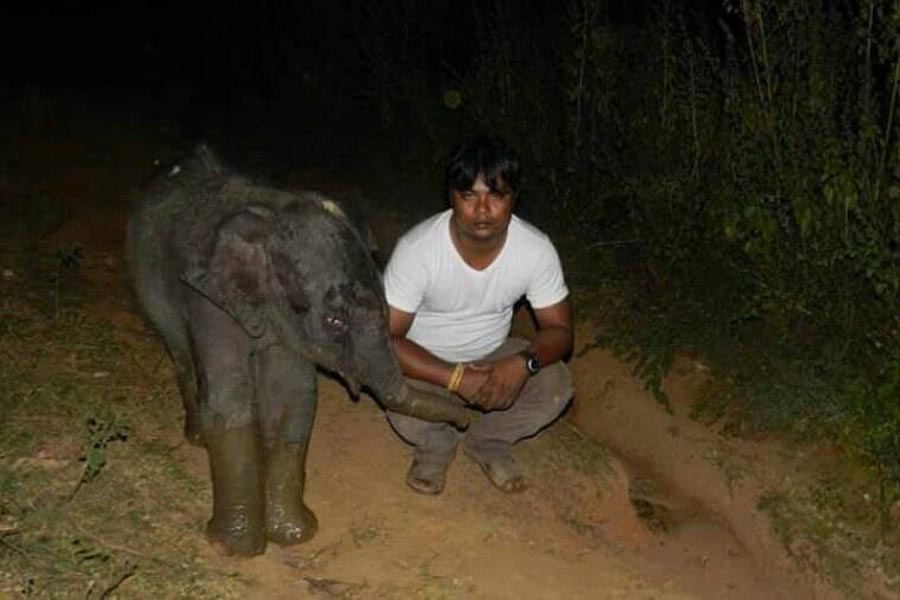
Binod ‘Dulu’ Borah is an animal rescuer from Assam’s Nagaon. Since 1998, he has recused over 2,500 animals and birds. Photo Courtesy: Binod BorahIn 1988, in the dead of the night, a hapless elephant calf insisted to a sleeping Binod Borah that it was about to fall into a neighbor’s well. The seven-year-old woke up with a start in the thatched hut he shared with his parents and elder brother in Assam’s Chapanalla village in Nagaon. The next morning, young Borah’s dream did not bode quite well with whomever he narrated it to.“Nobody paid attention to my story but I was relentless,” Borah remembers being very concerned about the elephant. When he finally convinced the villagers to inspect the neighbor’s well, the crowd was taken aback. Trapped inside, was true, a baby elephant — “the same calf I had seen in my dream!” recalls Borah.
Till now, Borah has rescued around 400 snakes including cobras, pythons, and kraits.
On the Discovery channel, he learned how to catch snakes. “Earlier, I used to catch snakes with my bare hands. Now I have started using equipment,” says the 38-year-old who insists that it is nothing but ‘fascination’ that leads him to rev up his motorbike and help any animal in distress, no matter how far away. Though “his most satisfying rescue operation ever” was in a village called Mejigaon in Karbi Anglong in 2013.“The villagers had started worshipping an elephant calf as their Devi (goddess) — keeping it hostage for four days. I went to the village and requested them to let the calf go or else it would die. Instead, they surrounded me, machetes, axes, and sticks in hand,” says Borah. That evening, he ran for his life.“However, I returned at midnight when the villagers were fast asleep. I had practiced the trumpet of elephant earlier and the skill came very handy here,” says Borah. The rescuer “trumpeted”; the calf, who wasn’t tied up, came running. Borah later handed it over to the forest department.
While this one wasn’t a typical case of man-elephant conflict, instances are increasingly being reported from across Assam — Udalguri, Sonitpur, Nagaon, Karbi Anglong, Hojai, Golaghat and Majuli — as human settlements continue to increase exponentially.“Elephants have lost their habitat. So, they come down in search of food, and thereby destroy crops. You feel for the farmers also. These crops are their livelihood,” says Borah.Borah with an elephant calf he rescued. For nearly six years, Borah has been planting banana trees in a bid to provide wild elephants food in their natural habitat. Now there are 25,000 such trees in an area of 200 bighas, barely 10km from Karbi Hills. “If we can ensure the elephants’ food in the hatidandi (elephant corridor), the conflict might be mitigated to a certain extent,” he says.
According to Aaranyak, a Guwahati-based wildlife NGO, 53 elephants were killed in Assam in 2018 while casualties on the human side were 64 in number.“Over the years, human attitude towards elephants has changed. Earlier, people used to worship elephants as Ganesha Devta. Now, they are wary in fact, many even nickname them Laden,” he says.
Borah is now a key member of the NGO, Green Guards Nature Organization, headquartered in Nagaon, and apart from rescuing animals and mitigating conflict, he is also creating awareness among local communities. For his work in this regard, he was awarded the Conservation through Innovation Award by the Balipara Foundation in 2014. In the same year, he was a recipient of the Wildlife Services Award from Sanctuary Asia.
Borah’s wife Meghna Mayur Hazarika, also an avid animal lover, has rescued snakes and birds in her neighborhood in Kaliabor, Nagaon.
Borah’s love for animals is also found his love in his own life. In 2015, he met his wife Meghna in Koliabor, at a photo exhibition of all the animals he rescued. “I noticed her because she was looking at the photographs with rapt attention. I wanted to ask for her number but couldn’t gather the courage. Instead, I told her, ‘Inform me if a snake appears’,” he remembers, with a laugh. Even though a snake never “appeared”, multiple phone conversations restricted strictly to “animal talk” led them to fall in love. Four months back, the two married and now work as a team rescuing snakes, leopards, and elephants in the Nagaon-Karbi Anglong landscape — south of the Kaziranga National Park in Assam.
Pradip Kumar Bhuyan, an environmental activist and educationist based in Guwahati, has been closely working with Borah on ways to mitigate the man-elephant conflict. Together they have identified corridors mapping routes elephants take — in them, they have planted bananas and other crops. If the model is successful, they plan to replicate it in other affected districts of Assam.
Describing him as a ‘born environmentalist’, Bhuyan says, “Dulu Borah is a fascinating individual. There are not many who would risk being pelted with stones by people while trying to save a 20-feet-long king cobra. In Chapanalla and around fifty surrounding villages, he has mobilized an army of around 800-900 people who are forever ready to respond to his clarion call to protect wildlife.”Borah received Sanctuary Asia Wildlife Service Award in 2014. Binod Borah’s social service is dedicated not just to animals but to humans too. When two years back at his behest, 35 tribal hunters dropped their bows, arrows, and traps, he took it upon himself to engage them in farming as an alternative means to their livelihood.
“If I don’t help these people, tomorrow they might be tempted to kill an animal again,” says Borah, who, in all these years, has never looked for a “proper salaried job”. “I grew up among animals. I have a strange sense of empathy towards them,” he says.

കൈരളി ന്യൂസ് വാട്സ്ആപ്പ് ചാനല് ഫോളോ ചെയ്യാന് ഇവിടെ ക്ലിക്ക് ചെയ്യുക
Click Here







